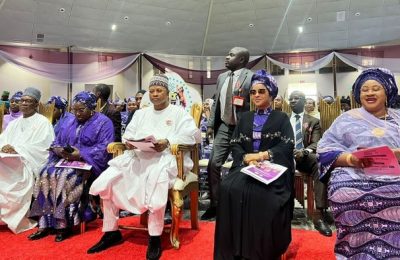THE Chairman Mao’s inspired Great March of 1934-35 reminds me of a dialogue between the Angels and the disbelievers which isbeautifully narrated in the Qur’an. The Red Army under the tutelage of Chairman Mao (his real name: Mao Zedong 1893-1976) relocated to another region with a view to escaping the brutality of the regime of the day in China. The move that was in consonance with the Qur’anic injunction which stipulates relocation from one’s current domicile to another in a case of real or perceived oppression” (Q.4: 97).
The dialogue mentioned above is about the event of the day of resurrection when the disbelievers will be queried by the Angels for coming to the arena empty-handed. In their response, the disbelievers will blame their coming without any provision on incessant harassment and intimidation by their oppressors. “But you should have taken the advantage of the vast expanse of land provided by God to migrate away from the oppressors,” the Angels will reason (Q.4: 97).
I am using the brief anecdote to prove both the beauty of Islam and the ever-currency/relevance of the Qur’an regarding any issue under the sun. The simple deduction from this anecdote is that more often than not, the outsiders and the arm-chair critics have found it convenient to see the behavioural pattern of a Muslim as representative of what Islam stands for, thereby blaming any inadequacies of a Muslim on Islam. Without any iota of doubt, the situation will be different should the critics spare some time to see Islam from the shade of the Qur’an. They will not only see Islam in its true colour but they will also see Islam in most of their dealings. Consequently, they will appreciate the Islamic model of nation building. For example, Islam draws the attention of man to the power of intellect as a guiding light in all matters either spiritual or mundane. Intellect (al-fikrin, Arabic) is repeatedly referred to in the Qur’an as the powerful tool man requires to understand himself and his environment. Given the fact that man and his environment are vividly described in the Qur’an, it is mandatory that man possesses the skill to read the Qur’an as well as the intellectual capacity to decode its message. In other words, possessing intellectual capacity becomes a major issue because the Qur’an is basically addressed to those who can think/reflect about the creation of the heavens and the earth (Q.3: 191).

Similarly, man is informed that signs are always explained explicitly to those who can think/reflect (Q.10: 25). Furthermore, examples and similitude are provided for education of those who can think/reflect (Q.59: 21). For the purpose of learning, such signs and examples as provided in the Qur’an revolve around how to build a relationship with Allah the Creator, develop mindset, build a family, develop a nation, build bridges on the religious and tribal lines, manage a business, play politics, design education, manage inter-personal relationship, manage international relations, etc.Within the context of this write up, however, the example of nation buildingis singled out for discussion.
The Islamic model
From the Islamic perspective, building a nation takes three stages; the tripartite model that is exemplified in the life of Prophet Adam (AS). According to the Qur’an, Adam is designated as Allah’s vicegerent (khalifah), that is, the one to oversees the affairs of the earth. But Adam’s mission on the earth was disclosed to the Angels prior to his creation which clearly suggests that Adam’s duty post (the earth) was already in place before the creation of its manager. It is also instructive to note that Adam was given comprehensive education about his duty post (the earth). He was temporarily accommodated in the garden from where he later proceeded to the earth, his duty post. Obviously, Adam’s departure from the garden to the earth (his duty post) could not have been punitive for any sin committed because both his mission and duty post had been determined ever before his creation as disclosed at the meeting with the Angels. So, his forward march to the earth was an integral part of the agenda and should not be seen as a punishment for any sin committed. The Islamic model of nation building as detailed in this scenario is that Adam’s duty post (likened to infrastructure) was ready before his arrival on the scene. Secondly, Adam was given comprehensive education, “allam Adam al-asmaakullaha”. Thirdly, assumption of duty by Adam took effect in earnest on arrival relying on the infrastructure he found in place. The sequence is crystal clear, namely, (1) the development of the infrastructure, (2) the preparation of the manager, and (3) the assumption of duty which in the modern parlance is equal to the euphoria about democracy. The main thesis of this write-up is to identify the factors that have so far rendered the attainment of nation building elusive in Nigeria. And that is by means of juxtaposing the Islamic model of development with that of American example.

The American example
As noted above, the Great March by the Red Army under the tutelage of Chairman Mao partially resembles the divine injunction that prescribes relocating away from a trouble spot for security and freedom. The effect of the Great March was the emergence of the modern China which is currently the second largest economy in the world. However, in the American example, we have the most striking resemblance of the Islamic model. What is quite striking in terms of resemblance is the sequence of putting in place adequate infrastructure, preparing the manager through a functional education and assumption of democratic politicking. The pilgrims, as the Europeans who later became Americans were known, fled their community in 1620 searching for security and freedom of worship. On arrival in the promised land between 1620 and 1789, the pilgrims engaged in infrastructural development as a topmost priority. They embarked on the construction of road network, bridges, residential apartments, schools, colleges, hospitals, hotels, factories, recreation centres, churches, power and water.
Alongside the construction of infrastructure, attention was simultaneously focused on education, the education that had religion as its cornerstone. Religion was so important to these early Americans that they quickly established Harvard Seminary to train church ministers. Interestingly, Harvard seminary metamorphosed into the popular Harvard University where every lecturer/professor must be a minister first and foremost because Christian ethics must be reflected in any academic discipline. The highest premium placed on religion by the early Americans can be noticed in the inscription of “In God We Trust” on their currency. The significance of that logo is the mutual trust, after trust in God, the Americans exchanged in the process of building America as well as its maintenance. To know more about the place of religion in the American affairs, it could be a worthwhile exercise to read ‘A New Religious America’ by Diana Eck (2002), a Harvard professor of comparative religion. One may even find it interesting to read ‘The Intellectuals Speak Out About God’ (1984). The two projects – infrastructure and education – continued till 1788 when the constitution was ratified. The constitution ratification was followed in 1789 by the election of the first American president, George Washington. These two events heralded full-blown democratic politicking (An Outline of American History 1992). The striking resemblance is that the Pilgrims spent 169 years on infrastructure and education both of which preceded the practice of democratic dispensation. The import of infrastructure and education before democratic euphoria is the availability of the ample opportunities which give the masses alternative means of making a living away from politicking to the extent that the few ones who opted for politics did so to render a service to their nation and not for money making. The impetus for using politics as a means of money making was nipped in the bud.
Putting the cart before the horse
In Nigeria, since 1960, the cart has been placed before the horse as undue attention was paid to democracy euphoria which, ideally, is the third and final stage in the sequence of nation building as demonstrated in the life of Adam and adopted by the pilgrims in the promise land in 1620-1789. Indeed, the euphoria about democracy in Nigeria did blur the vision of the politicians to the extent of diverting their attention from infrastructure development. Of course, if an error is perpetrated for a century, it remains an error and the only solution is its reversion. Unfortunately, there are indicators to the fact that the advocates of democracy in Nigeria lack knowledge of the nitty-gritty of democracy as shown in their inability to evolve a Nigerian democracy. In the Western world, for example, every country fashioned out its democracy based on the local culture and history. While democracy in England accommodates the King and the Queen, American democracy has no room for a King and a queen. The helmsman in America is called the President, in Germany she/he is Chancellor and the Prime Minister in Britain. The President in America can run only two terms of office while the Chancellor in Germany can run multiple terms. The functions of Nigerian politicians as highlighted below prove their inability to evolve a Nigerian democratic system that is based on our culture and history. What a shame!
First, the next election has always been the priority project for politicians who will start preparing for the next election immediately a general election is concluded; won or lost. While the winners start amassing funds through various orthodox and unorthodox methods in preparation for the next election, the losers are busy throwing stumbling blocks to the incumbent administration diverting its attention from the business of the day as evident in the August 2024 nationwide “stop bad governance protests”. Secondly, creating leakages by which stupendous monies are carelessly and ceaselessly dropped for the “boys” to pick. Erroneously, some naïve social critics call picking money from leakage corruption. An objective assessment of how leakages are created will exonerate the pickers of the money from leakages who should not be called thieves nor their action corruption. How can you call someone who innocently picked money that dropped from leakages a thief or his action corruption? Thirdly, it will be noted that the cost of managing democracy can be mind-boggling. For example, the politicians have always devised various means of increasing their earnings. To prove the point, one can compare the take-home of a lawmaker in 1999 to that of his counterpart in 2024 in addition to the controversial constituency development allowances.
Fourthly, the size of government is extra-large as evidenced in the number of ministries, multiple ministers in some ministries, the bogus offices of the first lady at all the three tiers of government, the appointment of numerous political aids, and the questionable viability of Nigerian embassies in some countries with which we do not exchange any cultural or trade affinities. Fifthly, between 1999 and 2024, governors had questionably controlled the local governments’ funds thereby preventing any form of development at the local government level. Sixthly, In Saudi Arabia, the national oil company, ARAMCO, takes charge of oil business in all its ramifications. As a result, the Saudis make money that exceeds their needs. In contrast, the multinationals are in charge of Nigerian oil business while the NNPC merely plays a supervisory role. The direct effect of our oil policy is to make us perpetually dependent on loans to finance our annual budgets. Seventhly, the Nigerian educational system lacks a definitive structure. While Americans make religion the cornerstone of their education system, especially at the formative stage, the Nigerian intelligentsia are sharply divided on the status of the country vis-à-vis the position of religion thereby using different classifications to describe Nigeria such as secular, multireligious, etc.
Regarding party politics, members of a political party in America are birds of the same feather who are sincerely committed to the core values of their party. But the scenario is different in Nigeria where every party member has a personal interest to protect and should that interest be threatened anytime, he resorts to defection.
Professor Bidmos is a former Chief Imam of the University of Lagos.







